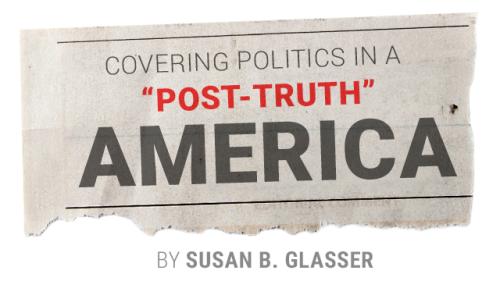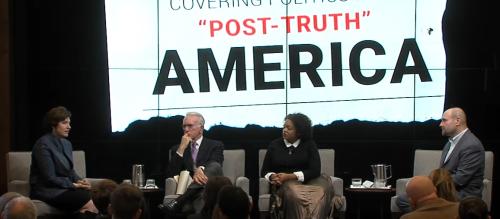Whether the Trump administration is providing “alternative facts” or telling the media to keep its “mouth shut,” it’s clear that the relationship between the administration and the press is strained, and will likely continue to intensify. As the press, administration, and the American public grapple with this new reality, we asked media experts to weigh in on a question that is top of mind for many:
What is the role of journalists and journalism during a time when the administration expresses hostility toward much of the media and shares “alternative facts”?
Shutting up is not an option
 E.J. Dionne, Senior Fellow, Governance Studies, Syndicated Columnist, Washington Post Writers Group
E.J. Dionne, Senior Fellow, Governance Studies, Syndicated Columnist, Washington Post Writers Group
For the media, shutting up is not an option. When confronted with untruths, all journalists have one and only one choice: to call them what they are. They cannot, without misleading the public, pretend that there are two sides to a purely factual question. Further, they need to avoid vague language about facts being “in dispute” when there is absolutely no question about what the facts are. Partisans might well emphasize some facts over others. But facts themselves aren’t partisan.
This, in turn, means that reporters may indeed seem “oppositional” when they confront an administration that, day after day, shows so little regard for fact or truth. But this is not the media’s problem. It’s Trump’s.
Even trickier is the bizarre way the administration has been doing business. Because Trump repeated to ABC News’s David Muir on Wednesday his claim that he’d find a way for Mexico to pay for his border wall, the administration scrambled to back him up. Spicer told reporters the next day that it would be financed by a 20 percent tax on Mexican imports — and then backed away from the idea partly because it was quickly pointed out that the tax would be paid by Americans, not Mexicans.
When the policymaking process veers wildly from point to point because it is driven by in-the-moment presidential impulses, not careful analysis, the country is in trouble. This, too, is something down-the-middle journalists will have to describe and analyze dispassionately.
Calmly pointing out the obvious may be the most damaging thing my reporting colleagues do to the Trump administration. Doing so won’t make them partisans or oppositionists, no matter what Bannon & Co. say. They’ll be patriots, and they’ll be doing their jobs.
Reporting honestly, fearlessly and independently is what journalism in a democracy is all about
 Susan B. Glasser, former editor of POLITICO
Susan B. Glasser, former editor of POLITICO
Dear fellow journalists, say it loud and say it clear: Doing our job doesn’t make us partisan hacks. Reporting honestly, fearlessly and independently about the Trump presidency is what journalism in a democracy is all about.
When Trump and his White House team attacked journalists as the “opposition party” and undermined the truth they report as “alternative facts” in their very first week in office, these were not idle comments or poorly worded missteps but a calculated, deeply cynical move from an old playbook.
Because the war on the press by Trump and his defenders didn’t start on January 20. It was a key part of what carried him to the White House, as I saw firsthand editing POLITICO throughout the 2016 election cycle. Trump’s been tweeting about the “failing” New York Times (while frequently giving interviews to its reporters) and personally banning news outlets like POLITICO from the campaign trail since his unlikely victory was merely a gold-tinged fantasy in the upper reaches of Trump Tower. He’s convinced such tactics helped win him the White House, and he’s probably right.
The modern media landscape is such that politicians like Trump have more tools at their disposal than ever before to create, produce, distribute, amplify or distort news as the news industry itself, and it means that they can play directly to Americans who already over the last several decades have seen the dismantling of the old media’s monopoly on information in favor of a chaotic proliferation of different reporting channels for every conceivable subject and point of view. This wouldn’t be working if the country hadn’t already chosen to live in a “cloud of like-minded spin,” as I put it in my recent Brookings Essay on the scary subject of “reporting politics in ‘post-truth’ America.” Nature, not to mention Donald Trump, abhors a vacuum.
But this isn’t just about forum-shopping for favorable coverage, a time-honored politicians’ game. The reason I have an existential fear about the future of independent journalism under Trump is because of how fast and how seriously his campaign – and week-old presidency – have destroyed the value of facts in our democracy.
So while Trump and his chief strategist, the right-wing media entrepreneur Steve Bannon, lectured journalists to “shut up,” I don’t think that’s what they really want: amid the noise and confusion that have become our national politics, they’re perfectly happy to have journalists shouting along with them. It’s our authority and legitimacy they’re after.
Handling presidential disinformation will take time and trial and error
 Jonathan Rauch, Senior Fellow, Governance Studies
Jonathan Rauch, Senior Fellow, Governance Studies
For the first time since, well, ever, Americans are having to cope with the concept of disinformation. Unlike ordinary political lying, which tries to persuade people of particular things that are false, disinformation aims to sow doubt and cynicism about everything that’s true. When it succeeds, it leaves even well-informed people unsure of whom or what to believe. I knew it was working for President Trump when, during the campaign, I heard a law professor criticize Trump for lying, only to add, “Of course, none of them are trustworthy.”
If that’s Trump’s game, the defensive line he needs to push through is the credibility of the news media. So he challenges them frontally by calling them the “dishonest media,” and he undermines them obliquely by swamping them with nonsense. That puts reputable journalists in a box. If we cover White House disinformation, Trump runs us ragged, distracts our readers, and dominates the agenda. If we don’t cover it, then fake news and conspiracy theories appear to stand. Anyway, how can we not report on the doings of the president?
My guess is that we will have to cover his falsehoods and lies, and we will have to be frank about their being falsehoods and lies (not just “contested,” “unsubstantiated,” or whatever other euphemism), but we’ll routinize them rather than lead with them. When disinformation triggers real-world news (for instance, if nonsense triggers a government investigation or a diplomatic incident), the real-world news will drive the story. When disinformation is just stuff the president or administration is saying, it will ride in a running feature, like the nightly body count in Vietnam.
That’s not a recommendation, it’s a guess. For U.S. journalism, presidential disinformation is terra incognita. Figuring out how to handle it will take time and trial and error. The truth is that all the options are bad, except one, which is for the president to clean up his act.
The Brookings Institution is committed to quality, independence, and impact.
We are supported by a diverse array of funders. In line with our values and policies, each Brookings publication represents the sole views of its author(s).


Commentary
A new era of reporting under the Trump administration
January 31, 2017